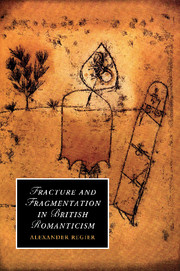Book contents
- Frontmatter
- Contents
- Acknowledgements
- List of abbreviations
- Broken origins: an introduction
- 1 A brotherhood is broken: Babel and the fragmentation of language
- 2 Figuring it out: the origin of language and anthropomorphism
- 3 Forces trembling underneath: the Lisbon earthquake and the sublime
- 4 A blue chasm: Wordsworth's The Prelude and the figure of parenthesis
- 5 Letters from the grave: John Keats's fragmented corpus
- 6 The doubling force of citation: De Quincey's Wordsworthian archive
- 7 Philological fractures: Paul de Man's Romantic rhetoric
- Notes
- Bibliography
- Index
- CAMBRIDGE STUDIES IN ROMANTICISM
6 - The doubling force of citation: De Quincey's Wordsworthian archive
Published online by Cambridge University Press: 06 July 2010
- Frontmatter
- Contents
- Acknowledgements
- List of abbreviations
- Broken origins: an introduction
- 1 A brotherhood is broken: Babel and the fragmentation of language
- 2 Figuring it out: the origin of language and anthropomorphism
- 3 Forces trembling underneath: the Lisbon earthquake and the sublime
- 4 A blue chasm: Wordsworth's The Prelude and the figure of parenthesis
- 5 Letters from the grave: John Keats's fragmented corpus
- 6 The doubling force of citation: De Quincey's Wordsworthian archive
- 7 Philological fractures: Paul de Man's Romantic rhetoric
- Notes
- Bibliography
- Index
- CAMBRIDGE STUDIES IN ROMANTICISM
Summary
Over many citations oneself becomes a citation.
Ralph Waldo Emerson considered the status and problem of citation as both fundamental and deeply troubling. In his essay ‘Quotation and Originality’ (1876), he writes: ‘We quote not only books and proverbs, but arts, sciences, religion, customs and laws; nay, we quote temples and houses, tables and chairs by imitation. […] The originals are not original.’ Knowing of our inability to produce outside the chain of quotations, however, still does not lead us to renounce ownership of our creations. As Emerson recounts in the same essay: ‘Wordsworth, as soon as he heard a good thing, caught it up, meditated upon it, and very soon reproduced it in his conversation and writing. If De Quincey said, “That is what I told you,” he replied, “No: that is mine, – mine, and not yours”.’
Emerson's conceptualisation of the power of citation and its metaphorical force through the figure of originals and precursors sounds almost like a prefiguration of a Bloomian anxiety of influence, or even a post-modern insistence on pastiche. Rather than reading this curious Emersonian fantasy in these psychoanalytical or intertextual terms, however, this chapter wants to suggest that its less obvious reverse – De Quincey's archiving of whatever Wordsworth claims for himself – is more revealing. It sheds light on how the rhetoric and language of criticism have to deal with the tensions that are produced through the practice of citation.
- Type
- Chapter
- Information
- Fracture and Fragmentation in British Romanticism , pp. 141 - 164Publisher: Cambridge University PressPrint publication year: 2010

